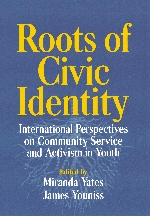Book contents
- Frontmatter
- Contents
- Preface
- List of Contributors
- Introduction: International Perspectives on the Roots of Civic Identity
- 1 Community Service and Political-Moral Discussions among Adolescents: A Study of a Mandatory School-Based Program in the United States
- 2 Social and Family Determinants of Community Service Involvement in Canadian Youth
- 3 Exploring Adolescent Altruism: British Young People's Involvement in Voluntary Work and Campaigning
- 4 Youth, Solidarity, and Civic Commitment in Italy: An Analysis of the Personal and Social Characteristics of Volunteers and Their Organizations
- 5 Political Socialization in the New States of Germany
- 6 Community Service and Social Cognitive Development in German Adolescents
- 7 Adolescents and the “Social Contract”: Developmental Roots of Citizenship in Seven Countries
- 8 Political Socialization in a Divided Society: The Case of Northern Ireland
- 9 Youth Experience in the Palestinian Intifada: A Case Study in Intensity, Complexity, Paradox, and Competence
- 10 Beyond the Call of Duty: The Service of Israeli Youth in Military and Civic Contexts
- 11 Recent Trends in Civic Engagement among Japanese Youth
- 12 Learning Politics in the Crucible: The Socialization of Taiwan High School Students as Citizens in a New Democracy
- Conclusion: Transcending Themes
- Author Index
- Subject Index
10 - Beyond the Call of Duty: The Service of Israeli Youth in Military and Civic Contexts
Published online by Cambridge University Press: 04 August 2010
- Frontmatter
- Contents
- Preface
- List of Contributors
- Introduction: International Perspectives on the Roots of Civic Identity
- 1 Community Service and Political-Moral Discussions among Adolescents: A Study of a Mandatory School-Based Program in the United States
- 2 Social and Family Determinants of Community Service Involvement in Canadian Youth
- 3 Exploring Adolescent Altruism: British Young People's Involvement in Voluntary Work and Campaigning
- 4 Youth, Solidarity, and Civic Commitment in Italy: An Analysis of the Personal and Social Characteristics of Volunteers and Their Organizations
- 5 Political Socialization in the New States of Germany
- 6 Community Service and Social Cognitive Development in German Adolescents
- 7 Adolescents and the “Social Contract”: Developmental Roots of Citizenship in Seven Countries
- 8 Political Socialization in a Divided Society: The Case of Northern Ireland
- 9 Youth Experience in the Palestinian Intifada: A Case Study in Intensity, Complexity, Paradox, and Competence
- 10 Beyond the Call of Duty: The Service of Israeli Youth in Military and Civic Contexts
- 11 Recent Trends in Civic Engagement among Japanese Youth
- 12 Learning Politics in the Crucible: The Socialization of Taiwan High School Students as Citizens in a New Democracy
- Conclusion: Transcending Themes
- Author Index
- Subject Index
Summary
When Israeli males and females reach the age of 18, they are conscripted into compulsory military service. The Israeli defense service law has set a term of 3 years for men, and 2 for women. However, several surveys of the motivation of potential conscripts to serve in the Israeli army (Gal, 1986; Mayseless, Gal, & Fishoff, 1989; Ezrahi & Gal, 1995) show that for the vast majority of Israeli youth (around 90% in surveys taken since 1975), conscription has been subjectively construed as fulfillment of personal duty. As noted by Gal, military service has become “part of the Israeli ethos – an integral phase in the life of any Israeli youth” (1986, p. 59). Dissidence, when occurring, has been limited to a small number of reservists (86 during the war in Lebanon and 165 during the Intifada) who refused active military service on moral grounds (Linn, 1996) and viewed their refusal as an unavoidable expression of their sense of duty and continued contribution to Israeli society (Helman, 1993).
The Hebrew expression is “to go to the army.” In practice not everybody “goes,” and “army” is a generic term also embracing the air force and the navy. Excluded from service are individuals disqualified for physical or psychological reasons, and groups exempted by virtue of their nationality (Israeli Arabs), gender (Druze females), family status (married women, fathers of six or more children), and religiosity (orthodox Jewish females, ultraorthodox females and males). Of those eligible for conscription, 99% report to service (Gal, 1986).
- Type
- Chapter
- Information
- Roots of Civic IdentityInternational Perspectives on Community Service and Activism in Youth, pp. 205 - 224Publisher: Cambridge University PressPrint publication year: 1998



